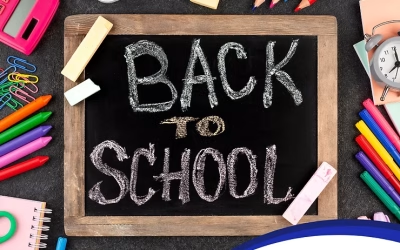As the new school year begins, the transition can be challenging for both kids and adults. At Athra Systems, we understand the impact that this period of change can have on mental well-being. To help ease the adjustment, we’ve compiled essential tips along with important mental health facts and statistics.
Mental Health Facts and Statistics:
- Stress in Children: According to the American Psychological Association, 31% of children report feeling more stressed about school than other aspects of their lives.
- Adult Stress: The National Institute of Mental Health (NIMH) states that 20% of adults experience high levels of stress during significant life changes, including back-to-school transitions.
- Sleep and Mental Health: The Sleep Foundation reports that 50% of children with sleep problems also experience anxiety and depression.
- Impact of Physical Activity: A study published in JAMA Network Open found that regular physical activity can reduce symptoms of depression by 25% in both adults and children.
For Kids:
- Establish a Routine: Consistency helps reduce anxiety. Create a daily schedule that balances schoolwork, breaks, and relaxation. Gradually adapt to the school routine a week before classes start.
- Encourage Open Communication: Foster an environment where kids feel comfortable sharing their feelings. Regular discussions about their worries can help them cope better.
- Promote Healthy Habits: Balanced meals, adequate sleep, and regular exercise are crucial for mental health. The Centers for Disease Control and Prevention (CDC) emphasizes that these habits support both physical and emotional well-being.
- Set Realistic Goals: Help kids set achievable goals and celebrate their progress. Achieving goals can boost their confidence and reduce anxiety.
- Incorporate Relaxation Techniques: Introduce techniques like deep breathing or mindfulness exercises. Research from the American Psychological Association shows these methods can effectively reduce stress.
For Adults:
- Prioritize Self-Care: Dedicate time to activities you enjoy. The Mayo Clinic highlights that self-care helps maintain mental balance and overall health.
- Stay Organized: Use planners or digital tools to manage responsibilities. Organization is linked to lower stress levels and increased productivity.
- Create Boundaries: Set clear boundaries between work and personal time. The Harvard Business Review notes that maintaining these boundaries helps prevent burnout.
- Seek Support: Reach out for professional help if needed. According to the National Alliance on Mental Illness (NAMI), therapy and counseling can provide essential support and coping strategies.
- Foster Connection: Maintain relationships with friends and family. Social support is crucial for mental health, as noted by the Mental Health Foundation.
For Both Kids and Adults:
- Practice Gratitude: Keeping a gratitude journal can improve mood and overall well-being. Research from the University of California, Berkeley, shows that practicing gratitude can increase happiness and reduce stress.
- Engage in Mindfulness: Mindfulness practices like meditation can manage stress and enhance resilience. The National Center for Complementary and Integrative Health supports mindfulness as an effective stress reduction tool.
- Stay Informed, but Limit Exposure: Stay updated but limit news consumption to avoid increased stress. The American Psychological Association recommends this approach to manage anxiety related to current events.
By integrating these strategies and understanding the mental health statistics, both kids and adults can better navigate the back-to-school transition. At Athra Systems, we are committed to supporting mental health and well-being at every stage of life. For more resources or support, feel free to reach out to us.











